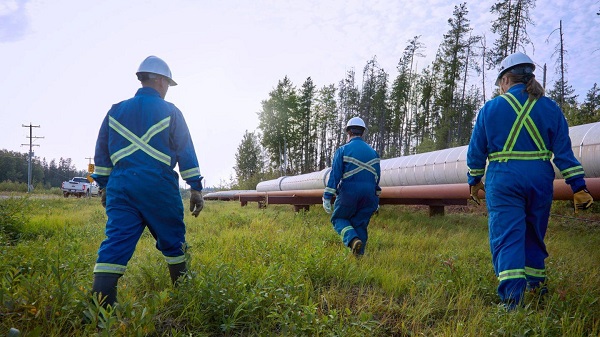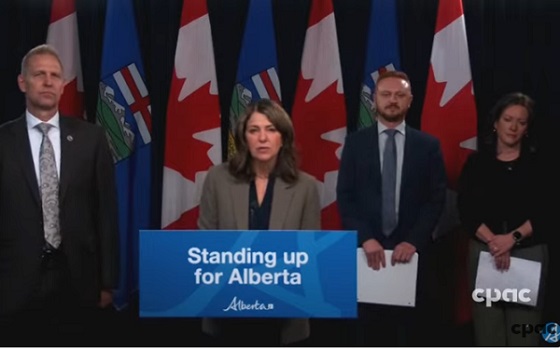Energy
Biden Has Taken More Than 200 Actions Against Domestic Oil, New Report Says

From HeartlandDailyNews
By
President Joe Biden and his administration have taken over 200 actions against the U.S. oil and natural gas industry as energy prices have gone up, according to a new report.
“President Biden and Democrats have a plan for American energy: make it harder to produce and more expensive to purchase,” the Institute for Energy Research states in a new report. “Since Mr. Biden took office, his administration and its allies have taken over 200 actions deliberately designed to make it harder to produce energy here in America.”
The analysis highlights actions Biden took on his first day in office, listing them chronologically through March of this year. The first act was canceling the Keystone XL pipeline, issuing a moratorium on all oil and natural gas leasing activities in the Arctic National Wildlife Refuge and revoking Trump administration executive orders that decreased regulations in order to expand domestic production.
Within a week of being in office, Biden issued additional moratoriums on new oil and gas leases on public lands or in offshore waters and imposed new regulations related to permitting and leasing practices, which were tied up in the courts for years. It was not until last month that a federal court upheld the first oil and natural gas lease sale on federal lands. Last December, the Fifth Circuit also ruled that Gulf lease sales must go forward.
Other actions ahead of the midterm elections include threatening to tax the oil and natural gas industry, blaming them for profiteering. Roughly six months before the general election, his administration has proposed $110 billion tax hikes on oil, natural gas and coal. In response, U.S. Sen. John Barrasso, R-Wyo., led a coalition of 24 senators expressing “grave concern” about his “continued hostility towards American energy production.”
IER published the report after the latest action taken to increase the cost of U.S. oil production and cancel plans to restock the Strategic Petroleum Reserve. The SPR has been depleted to roughly half of what it was when he first took office.
“President Biden had the chance to top up the SPR when prices were still low during the pandemic, but anti-oil-and-gas ideologues within the administration couldn’t bear to do anything that would help out producers when demand was low,” Kathleen Sgamma, president of Western Energy Alliance, told The Center Square. He then drained it “for political reasons and it’s long overdue to fill the SPR back up. Like many other politically driven decisions from this administration that distort energy markets, the government will have to spend more taxpayer money than if it had rational energy policies.”
Ed Longanecker, president of the Texas Independent Producers & Royalty Owners Association, told The Center Square that the Biden administration withdrawing approximately 250 million barrels from the SPR “was another dangerous example of putting politics over national security. The fact that some will believe the decision to cancel contracts to refill the SPR is due to a newly discovered fiscal consciousness is both nonsensical and alarming. Poorly conceived, albeit intentional energy policy results in higher costs for consumers, global emissions, and inflation, while putting our economy and energy security at risk.”
Daniel Turner, Founder and Executive Director for Power The Future, said instead of using American-produced oil to refill the SPR, Biden was “embracing insanity by putting the green agenda ahead of our families and our national security. Only in Joe Biden’s head does it make sense to lower costs by raising fees.” In light of Iran’s recent attacks against Israel, he said, “the world and our allies need a strong America that is fully utilizing our energy strength. Instead, the only things Joe Biden wants to strengthen is Iranian oil and Washington’s tax revenue.”
As the Biden administration imposes more fees on American oil producers, Iran’s oil exports reached $35 billion within the last 12 months, according to Iranian Labour News Agency. “Despite the reimposition of U.S. sanctions on Tehran in 2018, Chinese purchases of Iranian oil have allowed the country to maintain a positive trade balance,” Reuters reported. “Without oil exports, Iran would have registered a $16.8 billion trade deficit.”
U.S. House Republicans last month passed several bills and resolutions to strengthen the U.S. oil and natural gas industry, The Center Square reported. Only a handful of Democrats, largely from Texas, supported them.
Texas leads the U.S. in oil and natural gas production, having broken records in the last few years, The Center Square has reported. Because the majority of oil and natural gas is produced on private land and a bipartisan group of Texas elected officials and regulatory agencies are supportive of the industry, Texas has been able to achieve what most states have not.
Those in the Texas energy industry argue that, without their ingenuity and technological advancement, the U.S. would not be as energy independent as it is and prices would be higher. When the Russian-Ukrainian crisis hit, it was Texas LNG exports that provided a “lifeline” to European countries, a TIPRO analysis found.
“With so much uncertainty in the world, the need for reliable, responsibly produced energy from a stable trading partner has never been more crucial,” Texas Oil & Gas Association President Todd Staples said. “Texas is that trade partner. Our producers, pipelines, refineries, and exporters answer the call to alleviate the global energy crisis, made worse by war.”
He also argues that Texas’ production records “are not guaranteed. We cannot take for granted that this industry can continue to rewrite its record book in the face of federal policies blatantly designed to undermine progress. Delayed permits, canceled pipeline projects, closed and delayed federal leasing programs and incoherent regulations hurt American consumers and stifle our ability to deliver energy freedom and security around the world.”
Bethany Blankley is a contributor to The Center Square.
Originally published by The Center Square. Republished with permission.
Alberta
‘Existing oil sands projects deliver some of the lowest-breakeven oil in North America’

From the Canadian Energy Centre
By Will Gibson
Alberta oil sands projects poised to grow on lower costs, strong reserves
As geopolitical uncertainty ripples through global energy markets, a new report says Alberta’s oil sands sector is positioned to grow thanks to its lower costs.
Enverus Intelligence Research’s annual Oil Sands Play Fundamentals forecasts producers will boost output by 400,000 barrels per day (bbls/d) by the end of this decade through expansions of current operations.
“Existing oil sands projects deliver some of the lowest-breakeven oil in North America at WTI prices lower than $50 U.S. dollars,” said Trevor Rix, a director with the Calgary-based research firm, a subsidiary of Enverus which is headquartered in Texas with operations in Europe and Asia.
Alberta’s oil sands currently produce about 3.4 million bbls/d. Individual companies have disclosed combined proven reserves of about 30 billion barrels, or more than 20 years of current production.
A recent sector-wide reserves analysis by McDaniel & Associates found the oil sands holds about 167 billion barrels of reserves, compared to about 20 billion barrels in Texas.
While trade tensions and sustained oil price declines may marginally slow oil sands growth in the short term, most projects have already had significant capital invested and can withstand some volatility.
“While it takes a large amount of out-of-pocket capital to start an oil sands operation, they are very cost effective after that initial investment,” said veteran S&P Global analyst Kevin Birn.
“Optimization,” where companies tweak existing operations for more efficient output, has dominated oil sands growth for the past eight years, he said. These efforts have also resulted in lower cost structures.
“That’s largely shielded the oil sands from some of the inflationary costs we’ve seen in other upstream production,” Birn said.
Added pipeline capacity through expansion of the Trans Mountain system and Enbridge’s Mainline have added an incentive to expand production, Rix said.
The increased production will also spur growth in regions of western Canada, including the Montney and Duvernay, which Enverus analysts previously highlighted as increasingly crucial to meet rising worldwide energy demand.
“Increased oil sands production will see demand increase for condensate, which is used as diluent to ship bitumen by pipeline, which has positive implications for growth in drilling in liquids-rich regions such as the Montney and Duvernay,” Rix said.
Alberta
It’s On! Alberta Challenging Liberals Unconstitutional and Destructive Net-Zero Legislation

“If Ottawa had it’s way Albertans would be left to freeze in the dark”
The ineffective federal net-zero electricity regulations will not reduce emissions or benefit Albertans but will increase costs and lead to supply shortages.
The risk of power outages during a hot summer or the depths of harsh winter cold snaps, are not unrealistic outcomes if these regulations are implemented. According to the Alberta Electric System Operator’s analysis, the regulations in question would make Alberta’s electricity system more than 100 times less reliable than the province’s supply adequacy standard. Albertans expect their electricity to remain affordable and reliable, but implementation of these regulations could increase costs by a staggering 35 per cent.
Canada’s constitution is clear. Provinces have exclusive jurisdiction over the development, conservation and management of sites and facilities in the province for the generation and production of electrical energy. That is why Alberta’s government is referring the constitutionality of the federal government’s recent net-zero electricity regulations to the Court of Appeal of Alberta.
“The federal government refused to work collaboratively or listen to Canadians while developing these regulations. The results are ineffective, unachievable and irresponsible, and place Albertans’ livelihoods – and more importantly, lives – at significant risk. Our government will not accept unconstitutional net-zero regulations that leave Albertans vulnerable to blackouts in the middle of summer and winter when they need electricity the most.”
“The introduction of the Clean Electricity Regulations in Alberta by the federal government is another example of dangerous federal overreach. These regulations will create unpredictable power outages in the months when Albertans need reliable energy the most. They will also cause power prices to soar in Alberta, which will hit our vulnerable the hardest.”
Finalized in December 2024, the federal electricity regulations impose strict carbon limits on fossil fuel power, in an attempt to force a net-zero grid, an unachievable target given current technology and infrastructure. The reliance on unproven technologies makes it almost impossible to operate natural gas plants without costly upgrades, threatening investment, grid reliability, and Alberta’s energy security.
“Ottawa’s electricity regulations will leave Albertans in the dark. They aren’t about reducing emissions – they are unconstitutional, ideological activist policies based on standards that can’t be met and technology that doesn’t exist. It will drive away investment and punish businesses, provinces and families for using natural gas for reliable, dispatchable power. We will not put families at risk from safety and affordability impacts – rationing power during the coldest days of the year – and we will continue to stand up for Albertans.”
“Albertans depend on electricity to provide for their families, power their businesses and pursue their dreams. The federal government’s Clean Electricity Regulations threaten both the affordability and reliability of our power grid, and we will not stand by as these regulations put the well-being of Albertans at risk.”
Related information
- Conference Board of Canada socio-economic Impacts of Canada’s 2030 Emissions Reduction Plan – (April 2025)
- Alberta Electric System Operator’s position on Canadian Energy Regulations
-

 2025 Federal Election2 days ago
2025 Federal Election2 days agoNDP Floor Crossers May Give Carney A Majority
-

 Business2 days ago
Business2 days agoLosses Could Reach Nearly One Billion: When Genius Failed…..Again
-

 Bjorn Lomborg2 days ago
Bjorn Lomborg2 days agoHow Canada Can Respond to Climate Change Smartly
-

 Automotive2 days ago
Automotive2 days agoNew federal government should pull the plug on Canada’s EV revolution
-

 Alberta2 days ago
Alberta2 days agoPreston Manning: Canada is in a unity crisis
-

 Business2 days ago
Business2 days agoNew federal government plans to run larger deficits and borrow more money than predecessor’s plan
-

 Business2 days ago
Business2 days agoScott Bessent says U.S., Ukraine “ready to sign” rare earths deal
-

 Mental Health2 days ago
Mental Health2 days agoHeadline that reads ‘Ontario must pay for surgery to give trans resident both penis and vagina: appeal court’ a sign of the times in Canada






